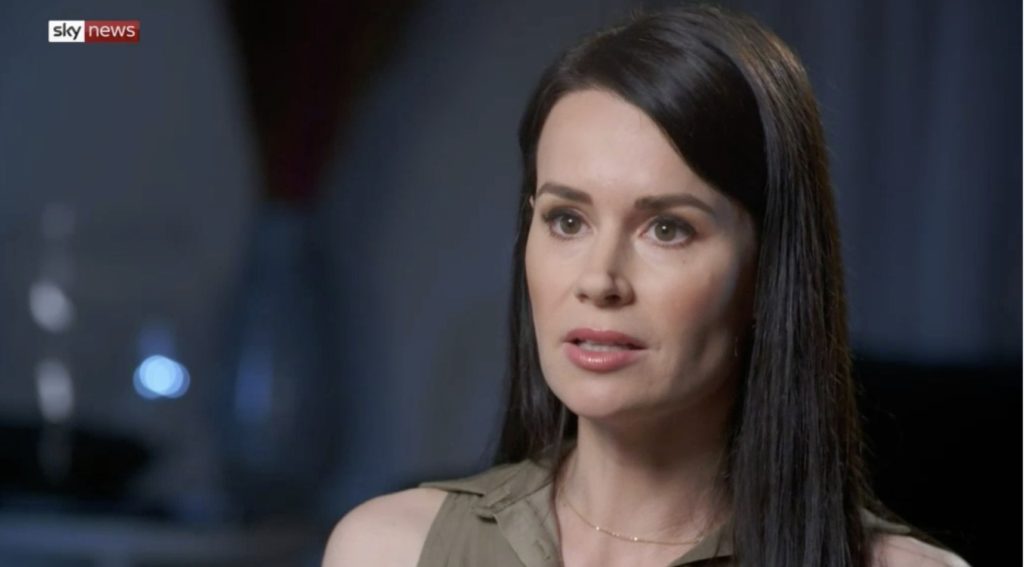IN THE MEDIA
Iran crosses line between hostage and prisoner
March 11, 2021 | Naomi Levin

This article was originally published in The Australian – 11 March 2021.
A little more than three months ago, Australian academic Kylie Moore-Gilbert was spirited out of Iran after two years of imprisonment in some of the world’s worst jails. Moore-Gilbert was released two years into her 10-year sentence for “espionage” after a complex prisoner swap that saw the release of two Iranians imprisoned in Thailand over a plot to bomb Israeli targets in Bangkok.
Moore-Gilbert could be forgiven for laying low and adjusting to life back home after her long incarceration on falsified charges. Instead, the University of Melbourne academic has been using her profile to draw attention to those she left behind in Iran’s notoriously brutal prisons — as well as the larger dreadful human rights picture in Iran.
Among the foreign citizens still being detained in Iran are Britons Nazarin Zaghari-Ratcliffe and Anooshe Ashoori, Swede Ahmadreza Djalali, Farida Adelkah from France, German Nahid Taghavi, Austrian Masud Mossaheb and Americans Morad Tahbaz, Emad Sharghi, Baquer Namazi and Siamak Namazi.
Moore-Gilbert has implored the regime to release 66-year-old Taghavi saying, “we hold grave fears for her physical and psychological health”. She has condemned extra punishments meted out to Ashoori for smuggling out messages about the spread of COVID-19 in Evin prison. She has advocated for Zaghari-Ratcliffe to be allowed to return to Britain on her release date of March 7. She deplored the detention of anthropologist Adelkah, saying she should be “celebrated by her homeland, not locked up and silenced”.
Moore-Gilbert also knows better than anyone just how horrible life is for Iranian political prisoners and has been sharing those insights. Ward 2A of Iran’s Evin Prison houses political prisoners and is notorious for the torture inflicted by its Islamic Revolutionary Guard Corps jailers. It was Moore-Gilbert’s home for nearly two years and she undertook a hunger strike to protest the conditions. On Twitter, she wrote of her 12-month solitary confinement: “2A is not designed for prolonged habitation, its very purpose is to break prisoners psychologically for interrogation.”
Prisoners are filmed 24 hours a day, even when using the bathroom. Inmates are blindfolded whenever they leave their cells, even for fresh air. In their cells, there are no pillows or mattresses, there are no chairs or tables. Medical treatment is dispensed as a “reward” for co-operation, she reported. She called Evin’s prison hospital “filthy” and said it ignored COVID-19 protocols. Prison staff did not wear masks and if inmates wanted to practise good hygiene, they had to somehow find masks and sanitiser.
Despite this horrendous treatment, Moore-Gilbert says she was able to make up little games when she shared a cell. “In my cell in 2A we had 2 rules,” she wrote on Twitter in January. “If we saw (Manchester City Football Club coach Pep Guardiola) on TV we had to jump. When this song (a Persian pop song) came on the radio we had to get up and dance.”
It is very clear Iran’s repressive and grotesque regime makes a practice of taking foreigners such as Moore-Gilbert and the others hostage to use as bargaining chips, extracting hefty concessions from other governments, mostly Western, to release them.
They can be pretty blatant about the practice, too. American hostage Wang Xiyue, who was released last year, has revealed his Iranian interrogator openly told him that they knew he had committed no crime and he was being held solely to exchange for US-held Iranian prisoners and the release of frozen Iranian assets.
This is part of a larger picture of gross human rights abuse the regime directs against its own citizens. Iran executes more people than any other country in the world, excepting perhaps China. Many of those executed are political dissidents condemned by clerical courts that offer defendants no real rights. Others are killed for the “crime” of being gay — Iran is estimated to have killed between 4000 and 6000 LGBTI people for crimes related to their sexual orientation between 1979 and 2008, and more since then.
There are things the international community can do. The Australian government recently joined 58 other countries in signing on to a Canadian-led declaration condemning the arbitrary arrest of foreign nationals by regimes to exercise leverage over a foreign government.
A parliamentary committee has also recommended Australia beef up its ability to sanction international human rights offenders by introducing “Magnitsky-style” laws.
In marking two months since her escape from Iran, Moore-Gilbert wrote on social media, “I can never regain the 2+ years which were stolen from me, but I am looking to the future with strength, positivity and a renewed appreciation for what I’d long take for granted — justice and freedom.”
Australians should be backing her quest to help Iranians also enjoy justice and freedom.





